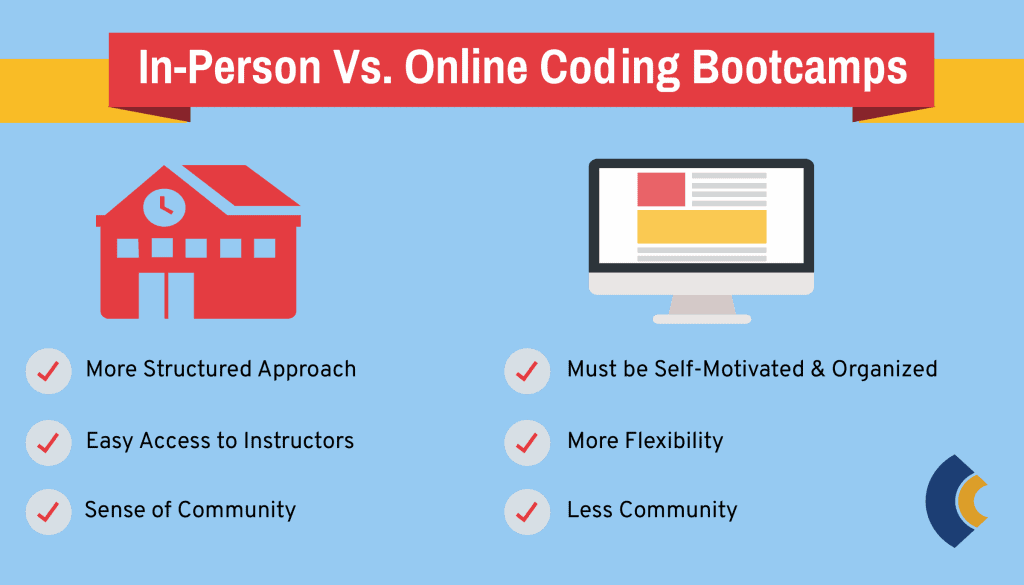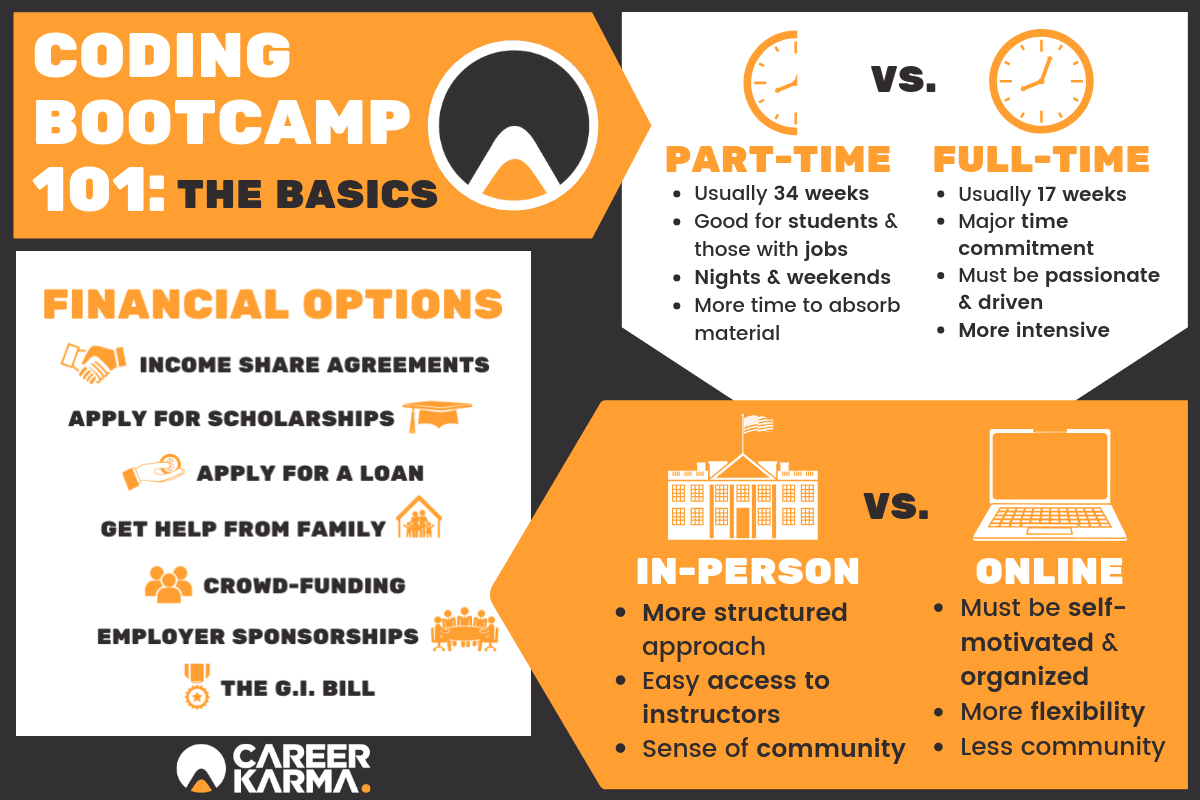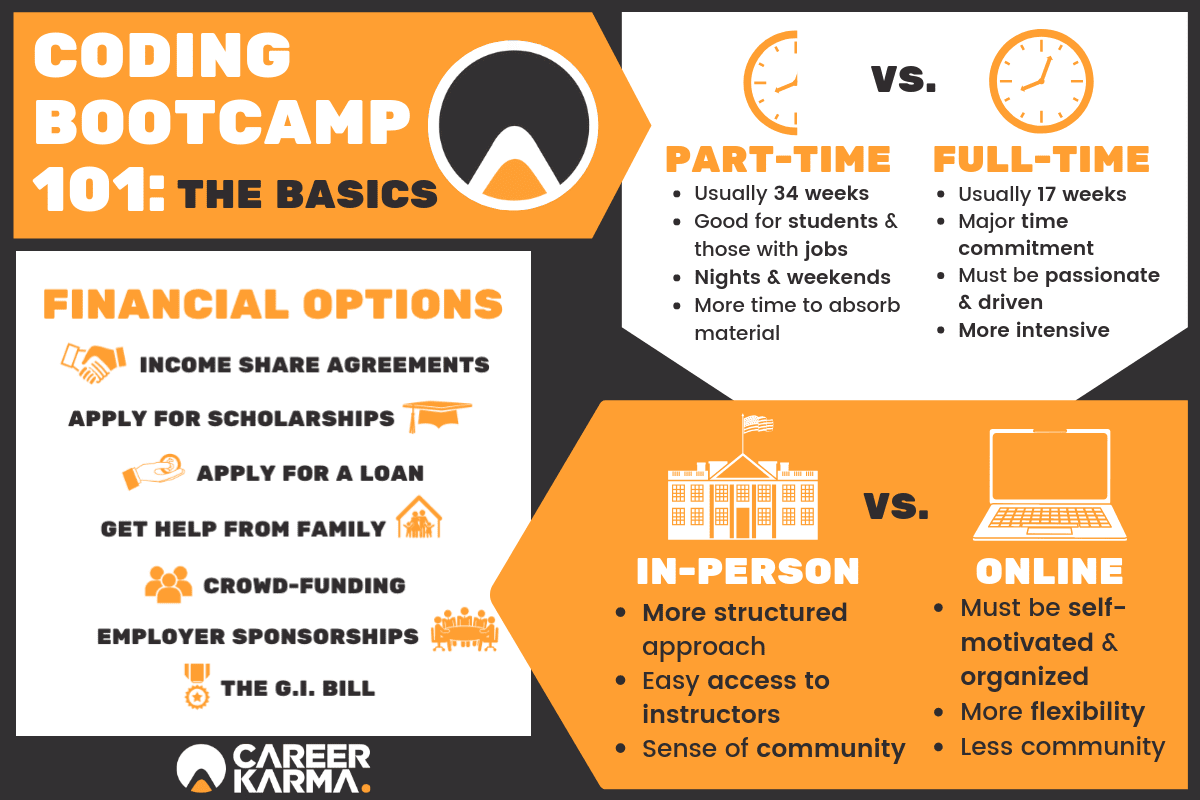Definition of a Coding Bootcamp

Coding bootcamps are intensive, short-term training programs designed to equip students with the practical skills needed to launch a career in software development or a related tech field. They differ significantly from traditional university education in their approach and focus.
Bootcamps prioritize hands-on learning and rapid skill acquisition, often covering a specific programming language or a focused set of technologies. This approach contrasts with the broader, more theoretical foundation provided by a computer science degree.
Typical Duration of a Coding Bootcamp
Coding bootcamps typically range in duration from a few weeks to several months, with the most common programs lasting between three and six months. This condensed timeframe allows students to quickly gain marketable skills and enter the workforce relatively rapidly. Some bootcamps offer part-time options, extending the overall program length. The intensity of the learning experience is a key characteristic.
Common Learning Objectives of Coding Bootcamps
The primary goal of a coding bootcamp is to make students job-ready. This involves mastering specific programming languages (like Python, JavaScript, Java, or Ruby), developing proficiency in relevant frameworks and libraries (such as React, Angular, Node.js, or Spring), and gaining experience in software development methodologies (like Agile). Many bootcamps also incorporate elements of project management, teamwork, and portfolio building. The curriculum often includes hands-on projects that simulate real-world development challenges, allowing students to apply their skills and build a portfolio to showcase to potential employers.
Comparison of Coding Bootcamps and Traditional Computer Science Degrees
Coding bootcamps and traditional computer science (CS) degrees serve different purposes and cater to distinct learning styles and career goals. A CS degree provides a comprehensive theoretical foundation in computer science, covering topics such as algorithms, data structures, and theoretical computer science. This broader education is ideal for students interested in research or advanced roles requiring deep theoretical understanding. In contrast, coding bootcamps focus on practical skills, providing intensive training in specific technologies relevant to immediate employment. Bootcamps are typically shorter and more affordable than CS degrees, making them a more accessible pathway for career changers or individuals seeking quicker entry into the tech industry. A CS degree often leads to a broader range of career options, while a bootcamp provides focused training for specific roles. For example, a graduate with a CS degree might pursue roles in research, software architecture, or data science, whereas a bootcamp graduate might target roles as a front-end developer, back-end developer, or full-stack developer. The choice between a bootcamp and a CS degree depends heavily on individual career aspirations and learning preferences.
Bootcamp Structure and Learning Environment
Coding bootcamps are intensive, immersive programs designed to rapidly equip students with in-demand tech skills. Their structure and learning environment are key factors in determining their effectiveness. A well-structured bootcamp provides a focused and supportive learning experience, maximizing student engagement and knowledge retention.
The daily schedule and learning methods employed significantly influence the overall learning experience. A typical bootcamp blends theoretical knowledge with hands-on practice, fostering a dynamic and collaborative learning environment.
Daily Schedule and Learning Activities
A typical day in a coding bootcamp is packed with activities designed to maximize learning. Students can expect a blend of lectures, practical exercises, group projects, and individual study time. The specific schedule may vary depending on the bootcamp and the curriculum, but a common structure involves a mix of instructor-led sessions and self-directed learning. This balance ensures both a strong foundational understanding and the development of independent problem-solving skills.
Teaching Styles and Methodologies
Coding bootcamps employ a variety of teaching styles and methodologies to cater to diverse learning preferences. Lectures provide a structured introduction to concepts, while hands-on exercises allow students to immediately apply what they’ve learned. Group projects foster collaboration, communication, and teamwork—essential skills in the tech industry. Many bootcamps also incorporate pair programming, where students work together on coding tasks, benefiting from peer learning and mentorship. This collaborative approach helps build confidence and encourages knowledge sharing. Mentorship from instructors and teaching assistants is often a key component, providing personalized support and guidance to students.
Assessment Methods
Regular assessments are crucial for tracking student progress and identifying areas needing further attention. Common assessment methods include quizzes, coding challenges, projects, and final exams. Quizzes test understanding of fundamental concepts, while coding challenges assess problem-solving abilities and practical skills. Projects, often culminating in a portfolio-worthy application, evaluate students’ ability to apply learned skills to real-world scenarios. These assessments provide valuable feedback, helping students identify their strengths and weaknesses and improve their performance. The frequency and type of assessments will vary across bootcamps.
Sample Daily Schedule, What is bootcamp in coding
| Time | Activity |
|---|---|
| 9:00 AM – 10:30 AM | Lecture: Introduction to Data Structures |
| 10:30 AM – 12:00 PM | Hands-on Exercise: Implementing Linked Lists |
| 12:00 PM – 1:00 PM | Lunch Break |
| 1:00 PM – 3:00 PM | Group Project: Building a Simple To-Do List Application |
| 3:00 PM – 4:30 PM | Individual Coding Challenge: Algorithm Implementation |
| 4:30 PM – 5:00 PM | Review and Q&A |
Career Outcomes and Job Placement

Coding bootcamps aim to equip students with the practical skills needed for immediate employment in the tech industry. The success of these programs is often measured by the career outcomes of their graduates, which are significantly influenced by the bootcamp’s curriculum, career services, and the overall job market. Understanding these factors is crucial for prospective students weighing their options.
What is bootcamp in coding – Graduates from coding bootcamps find employment across a range of roles within the technology sector. The specific roles and their prevalence vary depending on the bootcamp’s specialization (e.g., web development, data science, cybersecurity) and the current demands of the tech industry.
Common Job Roles for Bootcamp Graduates
Bootcamp graduates typically secure entry-level to mid-level positions. These roles often require practical skills and demonstrable projects, rather than extensive theoretical knowledge. The most common roles include:
- Front-End Developer: Building the user interface (UI) of websites and applications.
- Back-End Developer: Developing the server-side logic and databases that power websites and applications.
- Full-Stack Developer: Possessing skills in both front-end and back-end development.
- Web Developer: A broad term encompassing various roles involved in website creation and maintenance.
- Data Analyst: Collecting, cleaning, and analyzing data to extract insights.
- Junior Software Engineer: Contributing to the development and maintenance of software applications.
Companies that Hire Bootcamp Graduates
Many companies, both large and small, actively recruit bootcamp graduates. These companies recognize the value of practical skills and the often-intense training provided by bootcamps. Examples include:
- Large Tech Companies: Google, Amazon, Microsoft, and Facebook (Meta) often hire graduates for entry-level positions, particularly in areas like software engineering and data science. While competition is high, bootcamps can provide the necessary training and networking opportunities to increase the chances of success.
- Mid-Sized Tech Companies: Numerous mid-sized technology firms actively seek bootcamp graduates to fill roles requiring specific skills, often offering a more supportive and less competitive environment than large tech firms.
- Startups: Startups frequently hire bootcamp graduates due to their practical skills and adaptability. Startups often offer opportunities for rapid growth and significant responsibility.
- Smaller Businesses: Even businesses outside the tech industry are increasingly looking for developers to manage their online presence and internal systems. This presents a significant opportunity for bootcamp graduates.
Career Services and Job Placement Assistance
A key differentiator among bootcamps is the level of career services and job placement assistance provided. Effective career services significantly improve graduates’ chances of securing employment.
Many bootcamps offer:
- Resume and portfolio review: Helping graduates present their skills and experience effectively to potential employers.
- Mock interviews: Providing practice and feedback to improve interview skills.
- Networking events: Connecting graduates with industry professionals and recruiters.
- Job boards and postings: Providing access to exclusive job opportunities.
- Career counseling: Offering guidance on career paths and job searching strategies.
Salary Comparisons: Bootcamp Graduates vs. Traditional CS Degree Holders
The salary of a bootcamp graduate compared to someone with a traditional computer science degree is a complex issue. While a CS degree provides a broader theoretical foundation, bootcamps focus on practical, in-demand skills. Therefore, entry-level salaries can be surprisingly similar, particularly in specific roles. However, long-term earning potential might favor those with a CS degree, as career progression often requires deeper theoretical knowledge. Many factors, including location, experience, and specific role, affect salary. Precise figures vary greatly depending on location and the specific job, and generalized comparisons may not be entirely accurate.
It is important to research average salaries for specific roles in your target location rather than relying on broad generalizations. Online salary databases such as Glassdoor and Payscale can provide more precise information.
Cost and Financing Options

Choosing a coding bootcamp involves significant financial considerations. Understanding the cost structure, available financing options, and potential return on investment is crucial for making an informed decision. This section will break down the financial aspects of attending a coding bootcamp, comparing it to traditional computer science degrees and outlining various funding avenues.
Cost Comparison: Bootcamps vs. Computer Science Degrees
The cost of a coding bootcamp is considerably less than a traditional four-year computer science degree. While bootcamps typically range from $10,000 to $20,000, a four-year computer science degree can cost upwards of $100,000, including tuition, fees, and living expenses. This significant difference is primarily due to the shorter duration of bootcamps and their focus on practical skills rather than extensive theoretical coursework.
| Cost Factor | Coding Bootcamp | Computer Science Degree |
|---|---|---|
| Tuition | $10,000 – $20,000 | $30,000 – $80,000+ |
| Duration | 3-6 months | 4 years |
| Living Expenses | Variable, often lower due to shorter duration | Significant over 4 years |
| Total Estimated Cost | $12,000 – $25,000 (including living expenses) | $100,000 – $150,000+ (including living expenses) |
Financing Options for Bootcamp Tuition
Several financing options exist to help cover the cost of coding bootcamps. Many institutions offer flexible payment plans, allowing students to spread tuition payments over several months. This can significantly reduce the upfront financial burden. Additionally, many bootcamps partner with financing companies to provide income share agreements (ISAs) or private student loans. These loans are often tailored to bootcamp tuition and may offer more flexible repayment terms than traditional student loans. Scholarships and grants are also available, though they may be more competitive and require specific eligibility criteria. Some employers even offer tuition reimbursement programs that may cover all or part of bootcamp tuition.
Return on Investment (ROI) for Coding Bootcamps
The ROI of a coding bootcamp is often high, considering the relatively short duration and lower cost compared to a traditional degree. Graduates often see a significant increase in their earning potential within a short time after completing the program. For example, a graduate might earn $70,000 annually after a bootcamp, while their previous salary was $40,000. The difference, coupled with the lower cost of the bootcamp, can result in a faster payback period than a traditional degree, with the potential for substantially higher lifetime earnings. It is important to remember that individual results vary depending on factors like the specific bootcamp attended, the student’s skills and experience, and the job market. However, the potential for a strong ROI makes coding bootcamps an attractive option for many career changers and those seeking to upskill quickly.
Illustrative Financial Scenario
Imagine a hypothetical student, Sarah, who earns $45,000 annually in a non-technical role. She decides to attend a 12-week coding bootcamp costing $15,000. She secures a payment plan, paying $5,000 upfront and the remaining $10,000 over six months. After completing the bootcamp, Sarah secures a software developer position earning $80,000 annually. Her increased annual income is $35,000 ($80,000 – $45,000). Within a year, her increased earnings have surpassed the total bootcamp cost, demonstrating a rapid ROI. This is a simplified illustration; actual results will vary.
Choosing the Right Bootcamp: What Is Bootcamp In Coding
Selecting the right coding bootcamp is a crucial decision that can significantly impact your career trajectory. A well-chosen bootcamp provides the skills, network, and support necessary for a successful transition into the tech industry. Conversely, a poorly chosen one can lead to wasted time, money, and frustration. Careful consideration of several key factors is essential to ensure a positive learning experience and optimal career outcomes.
Choosing a bootcamp involves evaluating numerous aspects, from curriculum design and teaching methodology to location and career services. A thorough assessment process, including researching reviews and testimonials, asking pertinent questions, and carefully analyzing your own learning style and career goals, is vital. This section will guide you through the key considerations and provide a framework for making an informed decision.
Key Factors to Consider When Selecting a Coding Bootcamp
The decision of which coding bootcamp to attend should be based on a comprehensive evaluation of several critical factors. These factors should be weighed against your individual learning style, career aspirations, and financial capabilities.
- Curriculum: Evaluate the specific technologies taught, the depth of instruction, and the project-based learning opportunities. Look for a curriculum that aligns with your desired career path (e.g., web development, data science, cybersecurity). A strong curriculum will include a balance of theoretical knowledge and practical application.
- Location: Consider the convenience and accessibility of the bootcamp’s location. Online bootcamps offer flexibility but may lack the in-person networking opportunities of on-site programs. In-person bootcamps require commitment to a specific location but often provide a more immersive learning environment.
- Instructors and Mentors: Research the instructors’ experience and qualifications. Look for instructors with relevant industry experience and a proven track record of success in teaching. Mentorship opportunities can significantly enhance the learning experience and provide valuable career guidance.
- Cost and Financing Options: Compare the total cost of the bootcamp, including tuition fees, materials, and living expenses. Explore financing options such as loans, scholarships, or payment plans to ensure affordability. Consider the potential return on investment (ROI) based on projected salary increases after completing the program.
- Career Services and Job Placement Assistance: Assess the bootcamp’s career services, including resume review, interview preparation, and job placement assistance. A strong career services program can significantly improve your chances of securing a job after graduation. Look for data on their job placement rate and average salary of graduates.
Questions Prospective Students Should Ask Before Enrolling
Before committing to a coding bootcamp, it’s essential to ask specific questions to ensure it’s the right fit for you. This proactive approach will help clarify any uncertainties and allow you to make an informed decision.
- What is the bootcamp’s job placement rate and average salary of graduates?
- What is the curriculum and what specific technologies will be taught?
- What is the teaching methodology and learning environment like?
- What support services are offered, such as career counseling and mentorship?
- What are the financing options and payment plans available?
- Can I speak to current students or alumni to get their feedback?
- What is the bootcamp’s refund policy?
Importance of Researching Bootcamp Reviews and Testimonials
Reading reviews and testimonials from past students offers invaluable insights into the bootcamp’s strengths and weaknesses. These firsthand accounts provide a realistic perspective on the learning experience, instructor quality, career services, and overall value. Websites like Course Report and SwitchUp provide aggregated reviews and ratings for various coding bootcamps. Consider the volume and consistency of the reviews before making a decision. Pay attention to both positive and negative feedback to gain a balanced perspective.
Decision-Making Flowchart for Choosing a Suitable Coding Bootcamp
A flowchart can help streamline the decision-making process. The following example illustrates a simplified approach:
[Imagine a flowchart here. It would start with “Identify your career goals and learning style.” Then branch to “Research bootcamps based on criteria (curriculum, location, cost).” This would then lead to “Gather information (website, reviews, testimonials).” Following that, “Ask questions to bootcamps (curriculum details, career services, financing).” The next step would be “Compare and contrast bootcamps.” Finally, the flowchart would conclude with “Enroll in the best fit bootcamp.”] This visual aid would help structure the process of choosing a bootcamp logically and efficiently.


Tim Redaksi